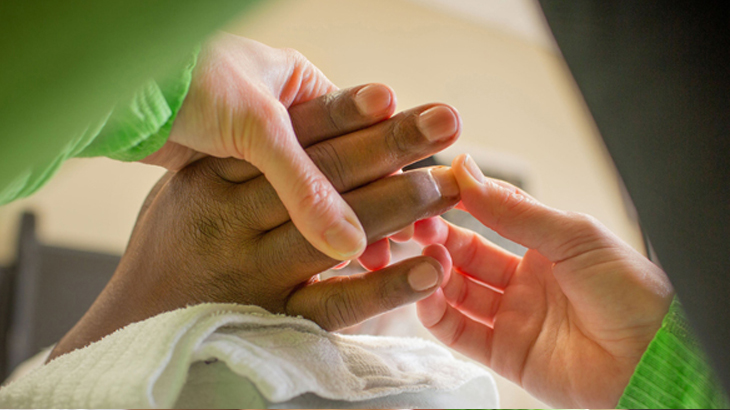
Minimally invasive surgeries use smaller incisions than traditional open surgical techniques. This advanced procedure also causes less pain and allows you to recover faster and more easily.
Our hand surgeons use minimally invasive surgery to treat conditions including:
Frequently asked questions
-
How do I know if I need to see a hand surgeon?
If you are experiencing numbness, tingling, pain, or lack of function in your hand, a hand surgeon is the right specialist for you to see.
-
What are the most common hand conditions that could require surgery?
Some of the most common conditions that may require surgery include acute conditions, like a broken bone in your wrist, hand, or finger, or an injury to a tendon or a nerve. We may also operate on degenerative conditions, like carpal tunnel syndrome, trigger finger, tendonitis, or arthritis.
-
Does my hand condition require surgery?
Your hand condition may not require surgery. We can treat many hand conditions with more conservative approaches, such as cortisone injections, bracing, splinting, or occupational therapy. Your hand surgeon will help you determine the right plan for you.
-
Do I need to seek treatment? It’s just a finger.
It is important to seek treatment from an orthopedic specialist with expertise in hand surgery, even if you are only experiencing numbness, tingling, or lack of function in one finger. Making sure the whole hand is functioning as a unit is very important. Dysfunction in one finger may lead to stiffness in a neighboring finger or weakness in grip. Every finger matters.
Prosthetics
In the event that an amputation becomes necessary, a state-of-the-art prosthesis can be created to replace the appearance and part of the function of the missing body part. These prostheses restore length to a partially amputated digit, supply opposition for a thumb or finger or, in the case of a total hand, stabilize and hold objects with bendable fingers.
Read more about prosthetics here.
Rehabilitation therapies
At MedStar Health, our hand specialists work with each patient to establish a treatment plan — including the techniques used in supervised and independent therapy sessions — based on their individual situation and needs.
Additionally, our therapists teach and guide each patient to maximize the use of the dysfunctional extremity while preventing re-injury or worsening of condition. Therapists may educate the patient on the disease process, the healing process, and rationale for the prescribed therapy techniques.
An assortment of services are offered, including
-
Management of acute or chronic pain
-
Protective splinting for immobilization and controlled motion post-operatively or post-injury
-
Exercise programs to restore motion, strength, and fine and gross motor coordination
-
Home exercise programs
-
Sensory re-education programs after nerve injury
-
Thermal and electrical modalities to minimize pain and swelling, facilitate restoration of joint motion and tendon gliding, and decrease hypersensitivity
-
Whirlpools to assist with wound healing
-
Social work consultations
Hand therapy
Evolved from both the occupational therapy (OT) and the physical therapy (PT) professions, hand therapy is a specialty that provides quality rehabilitation of the hand and arm. Therapists must meet education and experience requirements to become Certified Hand Therapists through the Hand Therapy Certification Commission.
Therapy is ideal for patients with:
-
Bone fractures
-
Wounds
-
Injured tendons or nerves
-
Amputation of a finger, hand, or arm
-
Repetitive motion disorders, such as carpal tunnel syndrome, tennis elbow, and arthritis
-
Neurological disorders
Upon referral, an experienced OT or PT completes a full evaluation of the affected extremity. Following the evaluation, an individualized treatment program is developed to address the patient's needs. The program is modified as necessary throughout the course of therapy to maximize functional outcome and use of the injured or affected extremity.
Amputations and replantations
With the technical advances afforded by modern science, it is now possible to reattach many amputated limbs. However, such replantation is not always in the best interest of the patient as function and appearance of the limb, hand, or digit may be better without it. The decision must be made based on a case-by-case basis. If reattachment is to be performed, it must be done with minimal delay.
The best hope for a successful replantation is when the amputation is sharp or clean. Crushed or contaminated amputations are avoided.
Hand and finger reattachments are more successful than those of the upper arm and shoulder. Replantation is often performed when multiple digits or the thumb are involved.
Age is a factor; children do better than adults with many replantations.
Our providers
Location: Change location Enter your location
Hand Surgery
-
William Hugh Baugher, MD
Hand Surgery
-
John S Foley, MD
Hand Surgery
-
Aviram Moshe Giladi, MD
Reconstructive Plastic Surgery & Hand Surgery
-
Curtis Mitchell Henn, MD
Hand Surgery & Orthopedic Surgery
-
James P. Higgins, MD
Reconstructive Plastic Surgery & Hand Surgery
-
Ryan M Jander, MD
Hand Surgery
-
Ryan David Katz, MD
Hand Surgery
-
Kenneth Robert Means, MD
Hand Surgery
-
Michael Sean Murphy, MD
Hand Surgery
-
Kevin O'Malley, MD
Hand Surgery
-
Jessica M. Figueroa, MD
Hand Surgery
-
Christopher Lee Forthman, MD
Shoulder And Elbow Orthopedic Surgery & Hand Surgery
-
Peter C. Innis, MD
Hand Surgery
-
Keith Alan Segalman, MD
Hand Surgery
-
Valeriy Shubinets, MD
Hand Surgery
-
George Li-Wen Yeh, MD
Hand Surgery









